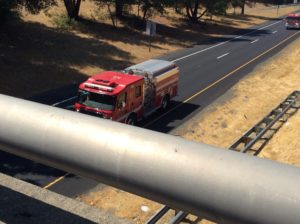 In August I sold my car Thor to a friend’s daughter who lives in Salem, Oregon. I offered to drive Thor to her doorstep, envisioning a nostalgic road trip punctuated with serendipity and fertile solitude.
In August I sold my car Thor to a friend’s daughter who lives in Salem, Oregon. I offered to drive Thor to her doorstep, envisioning a nostalgic road trip punctuated with serendipity and fertile solitude.
I had begun my cross-country drive-a-thon earlier in the summer when I flew into Miami Beach, where I had deposited Thor before returning to the university in Bulgaria where I teach. Being away from the States and viewing it from afar incubates an insistent hunger inside me to find evidence of American kindness and pluck, of goodwill and civility. In Bulgaria, I rely on a diet of stories about the States collected and curated by others. When I am here, I can find my own stories. I need to find my own stories. How better than to be a stranger in a land growing stranger. The road trip was my faith restoration tour.
I spent a week zigging and zagging up the East Coast from Miami to Vermont, hopscotching from friend to friend. Then the diagonal drive from Vermont to Flagstaff across the national midriff. I surveyed my country—this vast, nascent social experiment—from behind a windshield and through encounters with supermarket workers, hotel clerks, gas station attendants, waitresses, thrift store cashiers. Then I alighted on Flagstaff to rest, restore and revel.
It was with a satisfied internal hum that I set out for Salem five weeks later. After an overnight in Los Angeles with a friend and another in Berkeley, I tacked between Interstate 5 and Highway 101 into the wounded aftermath of some of the worst wildfires California has seen.
The Carr Fire outside of Redding dominated the news in the days before I left. Friends advised I check for road closures. The morning I left Berkeley, the interactive fire tracking map created by the San Francisco Chronicle made northern California around the town of Redding look bloodstained, each fire a red dot, the dots coalescing into red smears. And then the news that a firefighter who had come from Utah had died.
I know best what I have lived through, lived with. Water and wind have been the familiar natural destructive forces in my life. With fire I am an adult learner—removed, skeptical, analytical rather than visceral. I fear it. I respect it. And now after living in the Southwest for 14 years, I know the thrum of slurry bombers, the worrisome plumes of distant smoke, the protocol for fire evacuation.
According to the California Department of Forestry, as of the end of August, almost 6,000 fires have burned 1.2 million acres in the north of the state. One of the fires—the Mendocino Complex Fire, still ablaze—is the largest in the state’s history, a superlative of loss.
Day three of my trip. I slow to 30 mph as I pass through Ukiah on the 101. A line of fire trucks is parked in front of city hall. Groups of firefighters cluster nearby. As I continue up the highway, I see the ephemera of gratitude: posters thanking firefighters stuck into the roadside, car windows emblazoned with thanks and exclamation points, restaurant and hotel marquees with heartfelt messages.
I motor on. An overpass north of Ukiah is lined with a row of fire engines, their red lights circling. And then the next overpass. And the next.
I pull over to sate my curiosity, park my car and walk to the overpass. Six fire trucks stretch across the two-lane road. Their engines rumble. Firefighters huddle. A handful of civilians stand against the railing, their expressions grim. A man and woman approach, unfurl a banner and drape it over the side of the concrete wall. It says: We love you. We thank you.
“Here they come,” someone shouts. The two dozen gathered there face north, lined against the railing. A motorcade of fire trucks and ambulances drives beneath the overpass, their lights on in the customary show of honor for the dead. The firefighters salute. Two women beside me cry and embrace one another. The motorcade stretches for miles, a cortege for a fallen firefighter.
I continue north in silence. About 30 minutes up the road, the afternoon light becomes a jaundiced, sickly yellow. Turbo-charged plumes of black smoke billow to the west of Lake Shasta, obscuring the sun, morphing it into an eerie, faint orange disk in the sky. The air is over salted with smoke.
Beside the road, cars are melted into charred hulks sitting on rolling patches of fried grass. I pass the ashy skeletons of homes, barns, shops. People in masks at roadside stops give the scene apocalyptic undertones.
As I ascend into the forest flanking the highway, I think of Walt Whitman who heard America singing. I strain to hear the melody. Today it is faint and sorrowful.

